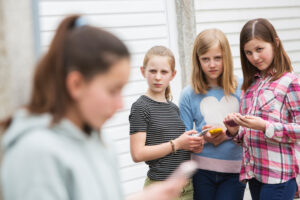 Do you remember your first bully—the girl who called you fat, mocked your choice in clothes, or spread false rumors about you? Of course you do. It’s like a first kiss, a first drink, the first time you drove a car. Only this is a memory you wish you could forget. You may not recall her exact words, but you remember the girl, the time, the place. Did you ever wonder why she did it, what provoked her meanness, how she got to wield so much power?
Do you remember your first bully—the girl who called you fat, mocked your choice in clothes, or spread false rumors about you? Of course you do. It’s like a first kiss, a first drink, the first time you drove a car. Only this is a memory you wish you could forget. You may not recall her exact words, but you remember the girl, the time, the place. Did you ever wonder why she did it, what provoked her meanness, how she got to wield so much power?
Bullying is an intentional act of aggression in which the perpetrator belittles, controls, intimidates or harms another person. Attacks are often unprovoked, and exploit an individual’s vulnerabilities or weakness. Although male bullying is typically straightforward, often involving physical aggression or blatantly hostile taunts, female bullying may be more subtle, and therefore, harder to detect. For girls, bullying can be a means of gaining popularity, jockeying for power among peers, or asserting control. Since it is more covert, teachers and parents may overlook clues, or assume the behavior is just a normal part of social interactions.
Some forms that bullying can take include:
- Deliberate exclusion, alienation, or ostracism of a peer for no apparent reason
- Verbal attacks, such as spreading rumors or lies by word of mouth or on the internet
- Making prank phone calls, or sending harassing e-mails or text messages
- Overt forms of aggression, such as stealing, making threats, or name-calling
- Covert forms of derision or humiliation, such as giggling or whispering about the victim when she is nearby, eye-rolling, being friendly one day and ignoring her the next
- Encouraging other girls to act out against, ignore, humiliate or pick on another child
So, why do girls resort to bullying? Reasons vary, but usually include a need for control, attention, and approval, or an outlet for anger. Girls who bully may appear threatening and commit hurtful acts, but they often harbor underlying insecurities that fuel their behaviors. Some feel lonely, inadequate, and fearful, and bully to feel powerful or hide their insecurity. Some attack first before they are attacked by others. Some are angry about problems at home and lash out at peers. Occasionally, girls who bully learn these behaviors at home due to family members who are abusive or because of a hostile neighborhood environment. Popularity is no safeguard, since often the girls who bully are those who seem to have it all. Frequently, the pretty, popular, athletic girls are the ringleaders who foster a culture of bullying, even though they may have already acquired power in the social hierarchies of their schools.
The process of bullying can develop slowly over time. Girls who are popular and charismatic may attract others into their circle of friends and make them feel special. They may then try to control these girls, expect favors, or demand that the new girls bully others as well. By controlling a group of peers, bullies achieve power in numbers and go on to terrorize teens they believe are a threat. Individual victims can be targeted at random, but are often selected because of jealousy, noticeable differences, refusal to conform to the group, or a weakness that can be exploited. Bullying also can be sparked by a sudden turn of events in a friendship, where the bully feels threatened and angry, and decides that she must retaliate.
While punches are not thrown, bullying can leave a devastating mark on its victim and engender long-lasting pain and suffering. Girls are particularly vulnerable because of how much they value friendships. Victims can become depressed, anxious, insecure, and feel they are to blame. Obsessive preoccupation with perceived flaws, physical appearance, conformity, and adhering to the bully’s rules of conduct can follow. Conversely, some girls who are bullied become isolated, withdrawn, and even drop out of school. In rare instances, victims can become so depressed and hopeless that they consider suicide as their only option.
Victims often remain silent due to embarrassment, self-blame, or fear of retaliation, so incidents of bullying may go unnoticed. Investigate whether bullying is occurring if your loved one, friend, or student is showing any of the following signs: mood swings, sudden withdrawal from friends, refusal to attend school or social events, sleep problems, academic difficulties, physical complaints, weight loss or gain, or frequent crying.
If you suspect that someone you know is being bullied, it is important to offer support. Reassure the victim that the bullying will end eventually, and that you will help her identify strategies for addressing the problem. One size does not fit all, so a variety of strategies and interventions should be considered depending on the specific situation. Useful websites with anti-bullying tips are listed below. Sometimes getting advice from a therapist or guidance counselor can help. Girls who bully also benefit from counseling, where they can learn to take responsibility for their behaviors and identify appropriate outlets for their anger and need for control.
Prevention is essential, and needs to come from both the family and community. Parents need to discuss bullying with their children, even before it occurs. Teaching girls how to respond to potentially difficult situations, before a problem develops, is critical. Helping young girls improve their self-esteem by developing strong academic, athletic or extracurricular interests, and finding friends who share similar interests (so that social standing is not as critical), may minimize their vulnerability to falling victim. Schools should offer anti-bullying initiatives, including training for staff, programs for students, and counseling services when necessary. When parents, schools, and the community promote an environment where bullying is unacceptable, perhaps fewer girls (and boys) will have to encounter that first bully.
Anti-Bullying Resources and Information:

The preceding article was solely written by the author named above. Any views and opinions expressed are not necessarily shared by GoodTherapy.org. Questions or concerns about the preceding article can be directed to the author or posted as a comment below.

 Effects of Subtle Peer Group Bullying on Development of the Self, Part I
Effects of Subtle Peer Group Bullying on Development of the Self, Part I The Antisocial Network: Social Media and Bullying Culture
The Antisocial Network: Social Media and Bullying Culture How Schools Can Learn from the Amanda Todd Bullying Tragedy
How Schools Can Learn from the Amanda Todd Bullying Tragedy

Please fill out all required fields to submit your message.
Invalid Email Address.
Please confirm that you are human.
Leave a Comment
By commenting you acknowledge acceptance of GoodTherapy.org's Terms and Conditions of Use.